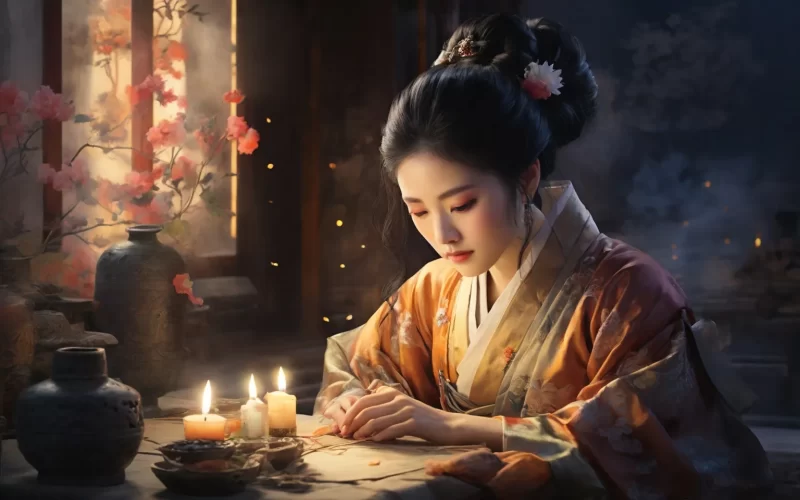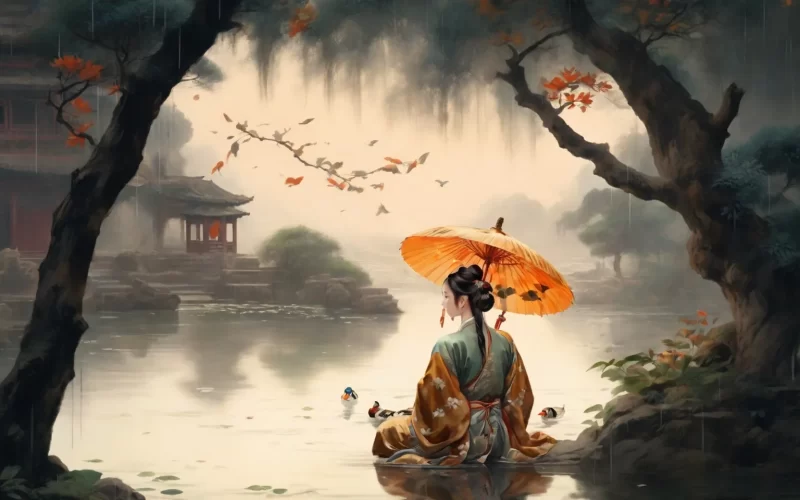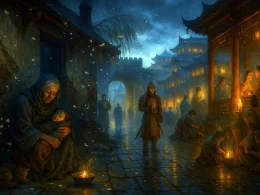The thread in the hands of a fond-hearted mother
Makes clothes for the body of her wayward boy;
Carefully she sews and thoroughly she mends,
Dreading the delays that will keep him late from home.
But how much love has the inch-long grass
For three spring months of the light of the sun?
Original Poem
「游子吟」
孟郊
慈母手中线,游子身上衣;
临行密密缝,意恐迟迟归;
谁言寸草心,报得三春辉。
Interpretation
Composed during the mid-to-late Tang Dynasty, this poem reflects the life of its author Meng Jiao, who endured poverty and career frustrations, wandering through his forties amidst life's hardships. His mother remained his deepest emotional anchor throughout. Being constantly away from home, Meng keenly understood his mother's silent toil and ceaseless concern, which inspired "A Traveler's Song" to express long-accumulated gratitude and remorse. Without mournful lament or impassioned rhetoric, the poem captures an ordinary moment with such authentic emotion that it has become one of Chinese classical poetry's most enduring tributes to maternal love, cherished for over a millennium.
First Couplet: "慈母手中线,游子身上衣。"
Cí mǔ shǒu zhōng xiàn, yóu zǐ shēn shàng yī.
"Thread in kind mother's hand; Traveler's robe worn afar."
The poet opens with an utterly mundane domestic scene—the "thread" and "robe" physically and emotionally connecting mother and son. This unembellished snapshot of reality instantly establishes an intimate, moving atmosphere.
Second Couplet: "临行密密缝,意恐迟迟归。"
Lín xíng mì mì féng, yì kǒng chí chí guī.
"Stitch by dense stitch before parting, Fearing his delayed returning."
The repetitive "dense stitches" visually convey both the mother's meticulous craftsmanship and her anxious devotion. Wordlessly, she weaves all her care into the fabric—each stitch a silent prayer for her wandering child.
Third Couplet: "谁言寸草心,报得三春辉。"
Shéi yán cùn cǎo xīn, bào dé sān chūn huī.
"Who claims inch-grass gratitude, Could repay triple-spring's magnitude?"
The metaphorical "inch-grass" (child's love) and "spring sun" (maternal care) create poignant asymmetry. Though the grass strains toward sunlight, its capacity to reciprocate the sun's bounty remains inherently limited—an emotional climax framed as rhetorical humility.
Holistic Appreciation
Structurally compact yet profoundly layered, the poem eschews dramatic farewells to focus on one quiet act of sewing. The interconnected imagery—"kind mother," "traveler," "thread," and "robe"—forges emotional depth within stillness. The first couplets depict maternal devotion's microscopic detail and macroscopic weight, while the finale's botanical metaphor expresses filial remorse with unpretentious authenticity. This natural emotional progression—from tenderness to solemnity to contemplation—resonates universally as both whispered farewell and wordless epiphany.
Artistic Merits
- Microcosmic Magnification: Elevates a mundane sewing scene into a timeless metaphor for maternal sacrifice
- Scene-Sentiment Fusion: The physical "dense stitches" embody psychological "delayed return" anxiety
- Unadorned Authenticity: Colloquial language achieves profound emotional immediacy
- Symbolic Contrast: The "inch-grass/spring sun" dichotomy crystallizes intergenerational asymmetry
- Architectonic Precision: Five-line structure progresses observation→emotion→philosophy with classical restraint
Insights
This poetic sewing needle threads eternal truths: greatest love often dwells in smallest gestures; silent care resonates loudest; ordinary acts bear extraordinary meaning. In our accelerated modernity where relationships often fray, the poem remains a mending thread—reconnecting us to filial piety's fabric and the quiet hands that first wove our worlds.
Poem translator
Kiang Kanghu
About the Poet
Meng Jiao (孟郊) was born in 751 - 814 AD, a native of Deqing, Zhejiang Province. Meng Jiao's poems include more than 400 poems, most of which are about personal sorrows and loneliness, expressing cynicism, while some of them expose the social phenomenon of disparity between the rich and the poor, and sympathize with the people's suffering.












